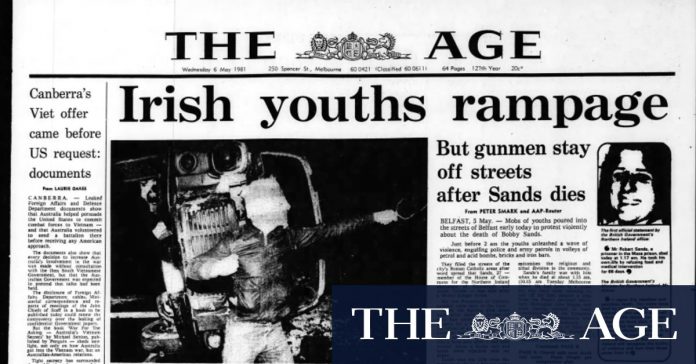The funeral that follows is expected to be attended by hundreds of thousands of Republicans from all over Ireland, the south and the north.
Sinisterly, the funeral could coincide with the death of a second hunger striker in prison, 25-year-old Francis Hughes, whose condition continues to deteriorate rapidly.
Britain was put on a nationwide security alert today following Sand’s death. The moment news of his death came from the Labyrinth Prison, a secret scheme was set in motion to thwart terrorist reprisals.
Every police station in the country was ready for a possible bombing or assassination attempt.
Individuals on a list of potential targets, including top politicians and members of the royal family, were under special guard. Additional police units patrolled the government and other prominent buildings.
Counter-terrorism detectives have known for weeks that the IRA could use Sands’ death as an excuse to attack the mainland again. Police in London, Birmingham, Glasgow, Liverpool and other areas with large Irish populations have been particularly vigilant.
In Oslo, a person protesting Sand’s death threw something at the Queen today when she arrived on a four-day state visit.
“Whatever it was, it was missing and something like tomato ketchup landed nearby on the floor,” said one witness.
The Queen did not seem to notice and may not have heard the “Bobby Sands” shouts from a tiny group of protesters among the cheering crowd of thousands.
The violence in Belfast that morning was mostly limited to attacks on security forces. There was no movement towards the Protestant areas over the wall and the “peace line” of the wire fence, which embody the religious and tribal differences in the community.
Sands’ family was with him when he died around 1:15 a.m. (10:15 a.m. Tuesday Melbourne time). He was in a coma for two days after refusing to break his fast despite a plea from the Pope’s personal secretary, Monsignor John Magee, and after refusing to meet commissioners from the European Commission on Human Rights who flew out of Strasbourg .
The British Foreign Secretary for Northern Ireland, Humphrey Atkins, described Sand’s death as “unnecessary and pointless”.
Irish Republic Prime Minister Charles Haughey said he was saddened that death had not been avoided through a “more flexible approach to prison management”.
Sands and three other hunger strikers fasted to get changes in prison rules regarding clothing and prison labor. The UK government has opposed the changes because it would be tantamount to granting political status to the IRA prisoners.
The consequences of Sand’s death are unpredictable. Only young people between the ages of 12 and 20 appeared to be involved in the riots that morning. The armed men weren’t in the street.
It is now known that a meeting of five loyalist (Protestant) paramilitary groups decided that no offensive action should be taken against Catholic areas and that no action should be taken against Protestant areas unless it was clear that police and Army couldn’t cope with it.
This decision is seen here as an attempt to thwart the IRA’s desire to increase the level of violence in Ulster, thereby increasing the price the UK government has to pay to keep Ulster part of the UK.
Belfast was tense and confused today in daylight. Helicopters and light planes buzzed overhead and there appeared to be an armed police officer on every corner.
When news of Sand’s death reached the Europa Hotel, the headquarters for hundreds of journalists from around the world who had flocked to Northern Ireland in the past few days, convoys of press vehicles sped into West Belfast.
Reporters found police and army patrols in their armored vehicles while gangs of 20 or 30 youths rained down on them from dozens of side streets.
The security forces used their vehicles as battering rams to knock down attempts to erect barricades at street entrances and thus create restricted areas.
But after three hours of turmoil, the city calmed down. The streets were covered with broken glass, stones, sticks, iron bars and garbage.
The youths had been taken to the streets by hitting trash cans – the traditional Catholic disaster in West Belfast.
But the absence of the head of the IRA confirmed statements by Republicans that the three days of Sands’ “lying in the state” should be viewed as a period of quiet grief.
Whether this tactical plan will prove possible is another question. Most violence in Ireland starts with a minor incident and then conditioned reflexes take over.
An IRA statement alleged that Sands was “murdered” by the British government. A spokesman said the republican movement was “very sad but also very angry. Bobby Sands should not have died if the British government had acted responsibly. “
The spokesman said the republican movement did not want Sand’s death and advised against going on hunger strikes. “But at the end of the day, the men in prison make their own decisions,” he said.
Mr John Hume, leader of the moderate Social Democratic and Labor Party, claimed that everyone but “the common people of Northern Ireland” wanted Bobby Sands dead.
The British government had wanted him to die or surrender, the IRA wanted him to die or win, and many trade unionists had only wanted him to die.
“The common people know the pressure under which a Bobby Sands was made, and they know the terrible consequences his death can have, but they wanted him to live,” said Hume.
The Reverend Ian Paisley, leader of the Democratic Unionists, said Sands made a conscious choice to die. “I would be a hypocrite if I said I was sorry that Sands was dead. My grief is for the innocent victims. Sands chose to die, but the IRA victims have no choice. “
Meanwhile, there have been a number of allegations that some European photographers paid youth in Catholic areas to throw rockets at security forces and then photographed the results. In particular, the charges are against several French photographers who claim they are false, despite bitter ethics disputes among photographers here.
At a meeting at the Europa Hotel yesterday evening, the photographers agreed not to take longer than about 10 minutes in one area. There was broad consensus that the prolonged presence of television and press cameras tended to exacerbate violence in Northern Ireland.
In Moscow, the Soviet news agency Tess announced the death of Bobby Sands a few hours after his death.
“In contempt for numerous protests of world opinion, the British Conservative government refused to satisfy the demands of Robert Sands and his colleagues and thus determined his death,” the agency said in a brief report from London.
The British police were expected to closely monitor the members of the royal family who appeared in public today: Princess Margaret visits Sadler’s fountain in London, the Duchess of Gloucester goes to Reigate in Surrey and the Duchess of Kent is in Cambridge.




